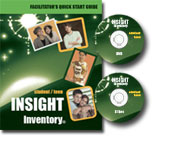|
|
||||||
| Questions? Phone 800.861.4769 | E-mail assessments@studentinsight.com |
Student | Teen INSIGHT Inventory®Norms, Reliability and Validity A brief summary of the statistical data obtained in the research and development of the INSIGHT Inventory is provided below. For complete descriptions and detailed tables of this data please request our Technical Manual. TECHNICAL CHARACTERISTICS
The INSIGHT Inventory is a self-report, personality inventory that measures the intensity of four bipolar traits: NORMATIVE DATA Norms provide the basis for interpreting scores in relation to defined groups of people. The INSIGHT Inventory is normed on a heterogeneous sample of 589 adults (Form B) and 1021 high school and college students (Form C). The sample composition of the norm group used for the student version (Form C) included: 709 students, ages 17-20, attending the American Youth Foundation conference representing most states and regions in the United States, equal proportions of males and females, 20% minorities; 59 high school students from a junior-senior level general English class, Blue Valley Kansas, equal proportions male and female, 10% minorities; 22 high school juniors and seniors from various counties in Missouri attending a 4-H Conference representing 60% females and 40% males from both urban and rural areas of Missouri; 169 college freshman and sophomores from Westminister College, Missouri; and 79 college freshman and sophomores, University of Kansas. The total normative sample of students contained 49% males and 51% females. Percentile scales reflect combined male and female norms. RELIABILITY Reliability is the degree of consistency with which a test measures what it is said to measure. Test length greatly affects reliability coefficients, with longer tests traditionally producing higher scores. Dr. J.C. Nunnally stated in the classic reference book, Psychometric Theory, 1978, that internal consistency reliability coefficients for short personality tests should range in the .70's to .80's. For example, the well researched Myers-Briggs Type Indicator reports internal consistency reliability for its four scales on general population samples to range from .61 to .87. Internal consistency reliability was computed on each of the four scales of the much shorter INSIGHT Inventory and the results ranged from .71 to .85. Thirty day test-retest reliability produced scores ranging from .76 to .82. Given its very short length, the INSIGHT Inventory produced very solid reliability coefficients. VALIDITY The validity scores of a test estimate how well the test measures what it purports to measure. Personality assessment tests usually produce validity scores for each of the individual traits measured. When scores on the traits of a test correlate well with scores on similar traits on the other tests, the test is said to have good concurrent validity. Validity coefficients were computed on each of the four INSIGHT Inventory traits by comparing these to the traits measured by the Myers-Briggs Type Indicator (MBTI), Sixteen Personality Factors (16PF), and Holland Self-Directed Search (SDS). This data comprises a large section of the INSIGHT Technical Manual and users are encouraged to review those pages and tables. Very strong support for the validity of the traits measured by the INSIGHT Inventory was garnered.
|


